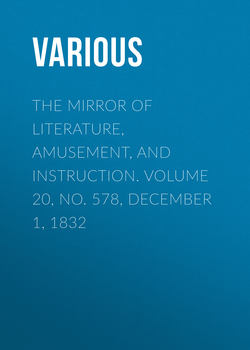The Mirror of Literature, Amusement, and Instruction. Volume 20, No. 578, December 1, 1832

Реклама. ООО «ЛитРес», ИНН: 7719571260.
Оглавление
Various. The Mirror of Literature, Amusement, and Instruction. Volume 20, No. 578, December 1, 1832
TANFIELD ARCH, DURHAM
THE RESTING-PLACE
THE HORSE "ECLIPSE."
THE NATURALIST
POISON OF THE HORNED VIPER
FISH BATTLE
NOTES OF A READER
INFLUENCE OF THE MIND ON THE BODY
RETROSPECTIVE GLEANINGS
ANCIENT BRIDEWELL.5
POVERTY OF KINGS, AND THE BRITISH CROWN PAWNED
HEAD-DRESS OF THE FOURTEENTH CENTURY, IN ENGLAND
SALADS
ADVERTISEMENT OF THE OPENING OF THE LONDON COFFEE HOUSE, UPWARDS OF A CENTURY AGO
SIR WILLIAM JONES'S PLAN OF STUDY
SPIRIT OF DISCOVERY
SAILING UP THE ESSEQUIBO
FINE ARTS
CROSSES.6
WINTER EXHIBITION OF PICTURES, AT THE SUFFOLK-STREET GALLERY
SCHOOL OF PAINTING AT THE BRITISH INSTITUTION
THE PUBLIC JOURNALS
SCRAPS FROM THE DIARY OF A TRAVELLER
ASMODEUS IN LONDON
DOMESTIC HINTS
WASTE OF BONES
GOOD FLOUR
LEGAL ADULTERATION OF BREAD
HIGH PRICE OF COALS IN LONDON
ROASTING COFFEE
THE GATHERER
THE ANNUALS FOR 1833
Отрывок из книги
TANFIELD ARCH, DURHAM.
Tanfield is a considerable village, situated seven miles from Gateshead, in the county of Durham, and eight miles in a south-west direction from Newcastle-on-Tyne. The above arch is about a mile from the village, and crosses a deep dell, called Causey Burne, down which an insignificant streamlet finds its sinuous course. The site possesses some picturesque beauty, though its silvan pride be
.....
Perhaps there is not a more remarkable instance on record showing, in a melancholy though forcible light, the dominion of mind over the material frame, than the circumstances which attended the death of John Hunter. This distinguished surgeon and physiologist died in a fit of enraged passion; and, what is somewhat extraordinary, he had often predicted that such excitement would prove fatal to him. He died at St. George's Hospital, Oct. 16, 1793, under these circumstances: being there in the exercise of his official duty as surgeon, he had a warm dispute with Dr. Pearson, on a professional subject; upon which he said, "I must retire, for I feel an agitation which will be fatal to me if I increase it." He immediately withdrew into an adjoining room; but Dr. Pearson, not being willing to give up his argument, followed him, which so annoyed Hunter, that he vehemently exclaimed, "You have followed me on purpose to be the death of me! You have murdered me!" and instantly fell and expired! Mrs. Byron, the mother of the noble bard, is said to have died in a fit of passion. Mr. Moore, in his life of Lord Byron, in speaking of Mrs. Byron's illness, says,—"At the end of July her illness took a new and fatal turn; and so sadly characteristic was the close of the poor lady's life, that a fit of ague, brought on, it is said, by reading the upholsterer's bills, was the ultimate cause of her death." A somewhat similar circumstance is recorded of Malbranche. The only interview that Bishop Berkley and Malbranche had was in the latter philosopher's cell, when the conversation turned upon the non-existence of matter, and Malbranche is said to have exerted himself so much in the discussion that he died in consequence. Sanctorius relates an instance of a famous orator, who so far exerted his mind in delivering an oration that he became, in a few hours, quite insane.
The effect of a too close application of mind to study on the bodily health has long been a matter of common observation. The Roman orator, Cicero, points out forcibly the dangers arising from inordinate exertion of mind; and he has laid down some rules for guarding against the effects of study. M. Van Swieten, in alluding to this subject, relates the case of a man whose health was severely injured, by what he calls "literary watchings." Whenever he listened with any attention to any story, or trifling tale, he was seized with giddiness; he was in violent agonies whenever he wanted to recollect any thing which had slipped his memory; he oftentimes fainted away gradually, and experienced a disagreeable sensation of lassitude. Rousseau has very justly remarked, that excessive application of mind "makes men tender, weakens their constitutions, and when once the body has lost its powers, those of the soul are not easily preserved. Application wears out the machine, exhausts the spirits, destroys the strength, enervates the mind, makes us pusillanimous, unable either to bear fatigue, or to keep our passions under."3
.....